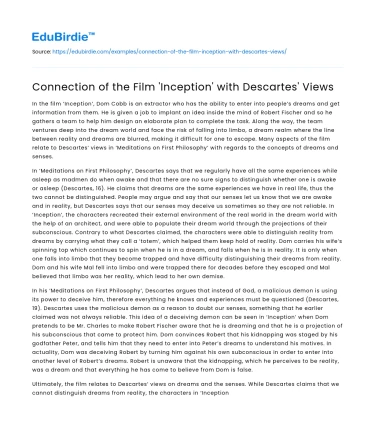In the film ‘Inception’, Dom Cobb is an extractor who has the ability to enter into people’s dreams and get information from them. He is given a job to implant an idea inside the mind of Robert Fischer and so he gathers a team to help him design an elaborate plan to complete the task. Along the way, the team ventures deep into the dream world and face the risk of falling into limbo, a dream realm where the line between reality and dreams are blurred, making it difficult for one to escape. Many aspects of the film relate to Descartes’ views in ‘Meditations on First Philosophy’ with regards to the concepts of dreams and senses.
In ‘Meditations on First Philosophy’, Descartes says that we regularly have all the same experiences while asleep as madmen do when awake and that there are no sure signs to distinguish whether one is awake or asleep (Descartes, 16). He claims that dreams are the same experiences we have in real life, thus the two cannot be distinguished. People may argue and say that our senses let us know that we are awake and in reality, but Descartes says that our senses may deceive us sometimes so they are not reliable. In ‘Inception’, the characters recreated their external environment of the real world in the dream world with the help of an architect, and were able to populate their dream world through the projections of their subconscious. Contrary to what Descartes claimed, the characters were able to distinguish reality from dreams by carrying what they call a ‘totem’, which helped them keep hold of reality. Dom carries his wife’s spinning top which continues to spin when he is in a dream, and falls when he is in reality. It is only when one falls into limbo that they become trapped and have difficulty distinguishing their dreams from reality. Dom and his wife Mal fell into limbo and were trapped there for decades before they escaped and Mal believed that limbo was her reality, which lead to her own demise.
Save your time!
We can take care of your essay
- Proper editing and formatting
- Free revision, title page, and bibliography
- Flexible prices and money-back guarantee
In his ‘Meditations on First Philosophy’, Descartes argues that instead of God, a malicious demon is using its power to deceive him, therefore everything he knows and experiences must be questioned (Descartes, 19). Descartes uses the malicious demon as a reason to doubt our senses, something that he earlier claimed was not always reliable. This idea of a deceiving demon can be seen in ‘Inception’ when Dom pretends to be Mr. Charles to make Robert Fischer aware that he is dreaming and that he is a projection of his subconscious that came to protect him. Dom convinces Robert that his kidnapping was staged by his godfather Peter, and tells him that they need to enter into Peter’s dreams to understand his motives. In actuality, Dom was deceiving Robert by turning him against his own subconscious in order to enter into another level of Robert’s dreams. Robert is unaware that the kidnapping, which he perceives to be reality, was a dream and that everything he has come to believe from Dom is false.
Ultimately, the film relates to Descartes’ views on dreams and the senses. While Descartes claims that we cannot distinguish dreams from reality, the characters in ‘Inception’ are aware that they are dreaming and use a totem to help them get a hold on reality. The only time when the characters cannot distinguish the difference between dreams and reality is when they are trapped in limbo. Descartes argues that there is a possibility of a demon using its powers to deceive him thus, he must question his senses and everything he knows as they are unreliable. This idea of a demon is portrayed in the film when Dom deceives Robert, who is unaware that everything he has come to know is false, to enter into another level of his dreams.






 Stuck on your essay?
Stuck on your essay?

